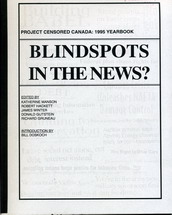

|
|

Blindspots in The News
Manson, Katherine; Hackett, Robert
Publisher: Project Censored Canada, Burnaby, CanadaYear Published: 1995 Pages: 62pp Resource Type: Book Cx Number: CX7327 The filters that determine what gets into the "news" and what doesn't. Abstract: Project Censored Canada was created on the U.S. model in 1993 under the impetus of Regina Leader-Post staffer Bill Doskoch and the Canadian Association of Journalists. Seeking an academic base on the U.S. Project model, they trolled across Canada and hooked both the School of Communication (Bob Hackett and Donald Gutstein) at Simon Fraser University in Burnaby, B.C., and the Department of Communication Studies (Prof. Jim Winter) at the University of Windsor in Ontario. Students at Canadian universities do the backgrounding and verification chores on the 150 nominated items and national judges (such as June Callwood, Francois Demers, Peter Desbarats, Maggie Siggins and Sources publisher Barrie Zwicker) make the selection of the key under-exposed stories. Bill Doskoch, in his introduction to Project Censored Canada's first report in 1994, said. "There is a growing acceptance of the idea that marketing - what people want to know versus what they need to know - should drive newsroom decision-making. Even worse, the 'wall' between advertising and editorial, once considered an impervious barrier, now appears to be crumbling. This demise is the result of the marketplace's decision that newspapers must be profitable no matter what the economic situation is." But there are other "filters" to block certain issues from the main media advanced in the PCC yearbook including: - the culture of journalism, that sees journalists sharing a point of view that is oblivious to the concerns of working people and other socially marginalized persons; - the economics of news that sees newsroom staffs shrinking and investigative reporting too expensive; - a reliance on official sources, that sees the powerful and the privileged getting "over-access" to the media while stories that may run against the grain of those sources are excluded; - pack journalism that sees the media playing it safe with "follow-the-leader" coverage; - technology that sees, as Neil Postman postulates, television with its "no-picture-no-go" gospel dominating and shaping the very nature of what is news. The PCC 1995 Yearbook includes an overview of what might be called "state censorship" in Canada in 1994, with references to such disparate events as: - Canada Customs detention and occasional destruction of books going to the Little Sisters Book and Art Emporium in Vancouver and Glad Day Books in Toronto; - child pornography charges against artist Eli Langer and the director of Mercer Union Gallery in Toronto; - the publication ban on details of Karla Homolka's manslaughter conviction to insure a fair trial later for ex-husband Paul Bernardo; - the refusal of five Ontario dailies to run an ad for an automobile consumer hotline; - and major media mergers, first of Rogers Communications Inc. takeover of Maclean-Hunter and then Telemedia Inc. and RadioMutuel Inc. in and out of Quebec. The Top 10 Canadian Censored Stories of 1995 1. Cleaning Up After AECL -- Atomic Energy Canada Ltd. will need a $300 million bailout to cleanup toxic hazards at old nuclear facilities. Sources: Canadian Press. 2. Canada's Own Free-Trade Deal -- Internal trade draft ignites labour's fears. Sources: The Globe and Mail, Pacific Current, The Vancouver Sun. 3. Third World Battles GATT Over Plant Patenting -- Intellectual property and livelihood of vast numbers of indigenous peoples put at risk by the General Agreement on Tariffs and Trade. Sources: Alternatives, The Ecologist. 4. White-Collar and Corporate Crime Overlooked -- Public and political preoccupation with violent offences. Sources: The Calgary Herald, The Toronto Star. 5. Tobacco Manufacturers and Cigarette Smuggling -- Huge profits for tobacco firms. Sources: This Magazine, The Toronto Star, The Montreal Gazette. 6. Reducing Interest Rates -- An alternative for debt reduction. Sources: The London Free Press, The Windsor Star, Canadian Forum. 7. The Canadian Wildlife Federation -- Hiding its hunting connections. Source: Canadian Forum. 8. The World Bank -- Funding forced resettlement in developing nations. Sources: Alternatives, The Montreal Gazette. 9. Fish Farming -- The environmental impact of salmon farming. Sources: The New Catalyst, Pacific Current. 10. The Chiapas Crisis and NAFTA -- The Zapatista versus the spin doctors. Sources: The Georgia Straight, Canadian Forum. Subject Headings |